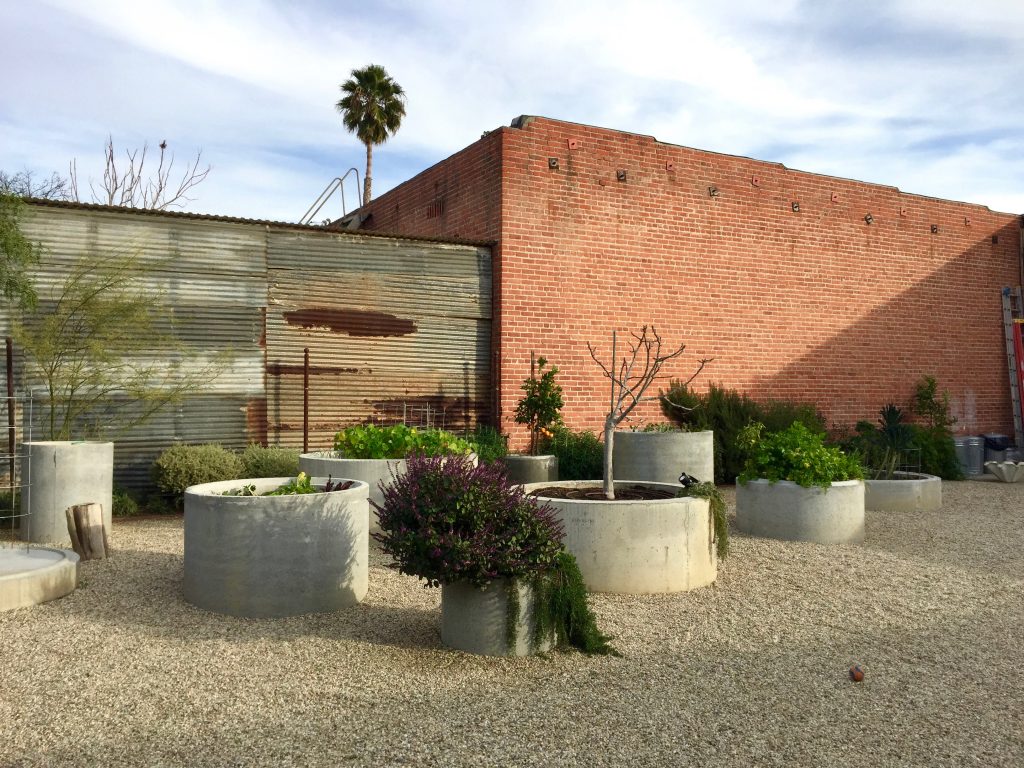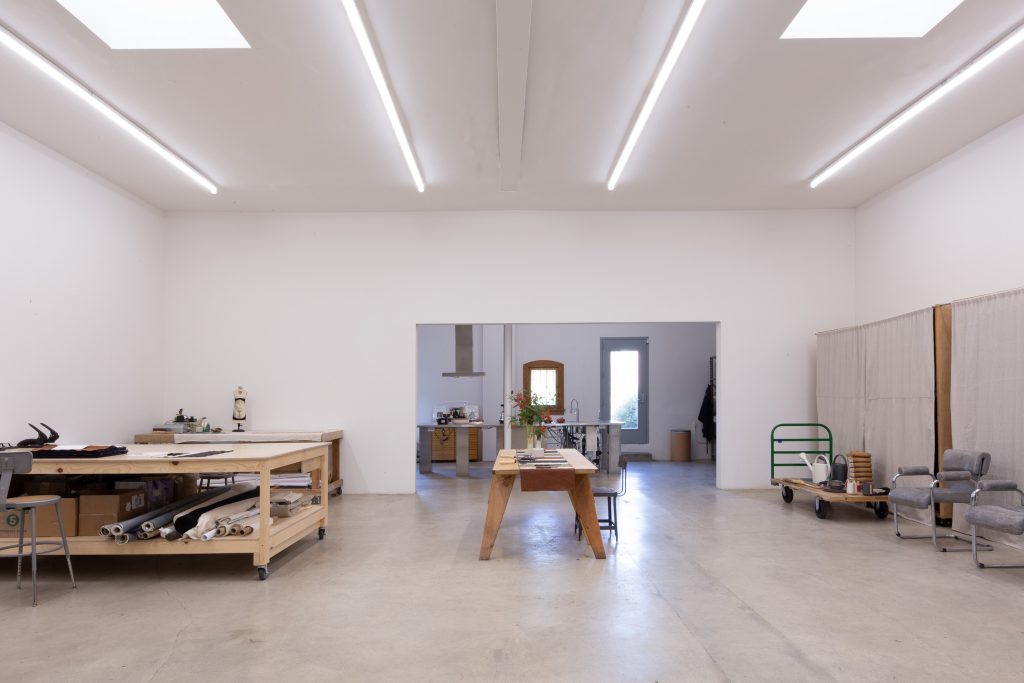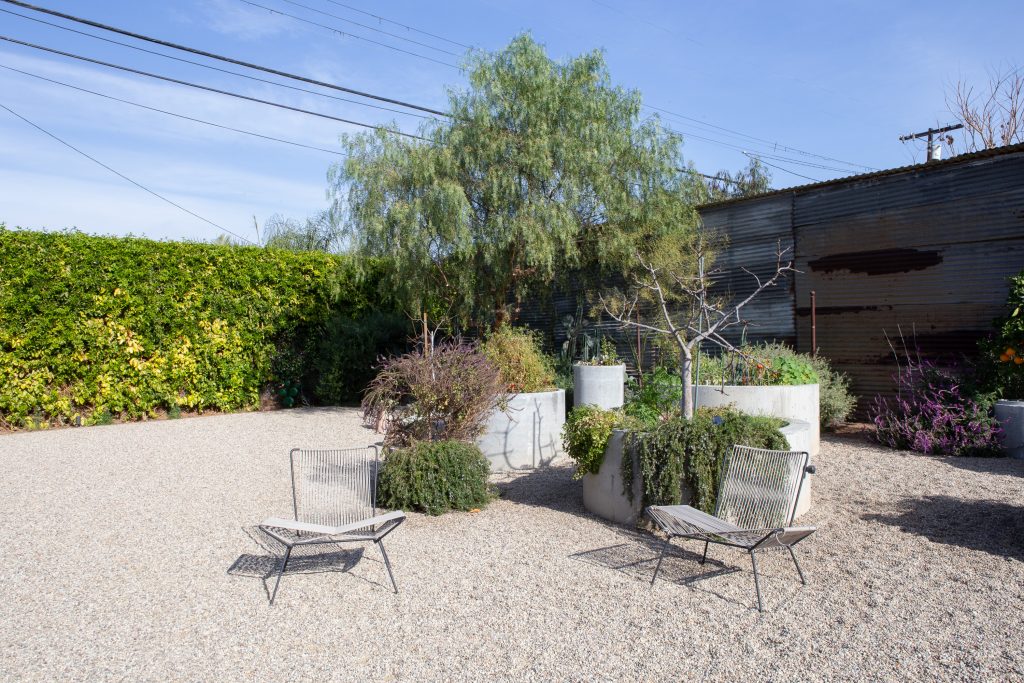Studio Visit: Flora Animalia
An edible garden and creative workshop space inspire Rozae Nichols’ newest workwear designs

After many years in the fashion industry, designer Rozae Nichols was searching for a new creative endeavor. She envisioned an edible garden and workshop space where she could share ideas about protecting the environment and nurturing a plant-based lifestyle. Nichols, who achieved numerous successes and realized dreams during her time working in fashion, was ready to take the next step. She shared her vision with longtime friends, architects Ravi GuneWardena and Frank Escher. After finding a historic building in the West Adams neighborhood in Los Angeles, Nichols brought Escher GuneWardena Architecture on to transform the building into her dream space, called Flora Animalia.
We recently visited the new studio and garden, and experienced an Ikebana workshop taught by GuneWardena (who is also the director of the Los Angeles branch of the Sogetsu Ikebana). The day filled with artistry, culture and community provided a fitting introduction to Flora Animalia.

The Flora Animalia building has lived many lives—as a fish market, as a clothing manufacturing facility, and as art studio spaces—and the Escher GuneWardena team worked closely with Nichols on the plans for its new life. It needed to be a garden-workspace hybrid, but had plenty of ideas about its nuances. Nichols also wanted to host workshops and events, and have multiple entrances and ways to get to the garden as well as to circulate within.

“I wanted to have a place to host conversations about things I care about: food insecurity, animal rights with an edible garden to explore growing food,” she says. “And to get back to basic elements of stitching and sewing and making and gardening, a holistic way of engaging activities to be happy human beings.”
GuneWardena adds that Nichols wanted “this to be a place of experimentation; space for making things that matter.” But the over-arching goal was “to create a feeling of calmness.”

GuneWardena and Escher considered the proportions of the space in order to achieve all of this. Inside, they stripped away partitions and extra walls. Outside, they restored the original brick and left the windows intact to lean into the patina and history of the space. The Flora Animalia studio began to take shape as an optimal space to explore art, craft and sustainability.

In back of the building, they cleared several sheds and leftover materials to create their urban oasis with a raised garden. “I wanted it to feel like sculpture. I wanted something circular that would echo the volume of Earthworks,” says Nichols. “I had in mind Michael Heizer, Walter De Maria and Nancy Holt’s ‘Sun Tunnels,’ and how they echo Bauhaus with the circular tube shapes. And the silos I see on long road trips. I am very drawn to the mass and volume of those works like Robert Smithson’s ‘Spiral Jetty.'”

During the process of building Flora Animalia and watching its edible garden grow, Nichols began to conceive a new clothing line—one that reflected her ethos. Sourcing high-quality organic fabrics, she embarked on a path—with echoes of her background in military-inspired style and workwear—into gardening apparel.
When touring the space, it’s easy to understand how Nichols found herself compelled to create the clothes and lifestyle pieces that belong there. “The core materials are organic cotton in denim and poplin in lighter weights,” she explains. “Our Belgian linen comes from Leibeco, a heritage mill in Belgium where they grow their own flax. Linen is tactile, from the earth and a green fiber that requires little to no pesticides. All of our fabrics are GOTS certified, the global organic textile standard.” Nichols cuts and sews everything in-house with an aesthetic informed by purpose. Flora Animalia clothing is complemented by a line of gardening tools, gloves and watering cans with items for the home, from vessels and tea towels to coasters and placemats.

It’s an idyllic setting to experience a more sustainable way of existing within the world. Nichols is happy to spend time in the studio and garden, seeing where the inspiration takes her and exploring how it allows her to interact with the surrounding community. To participate in this vision, Flora Animalia‘s workshop and event information can be found online.
Images by Janna Ireland












